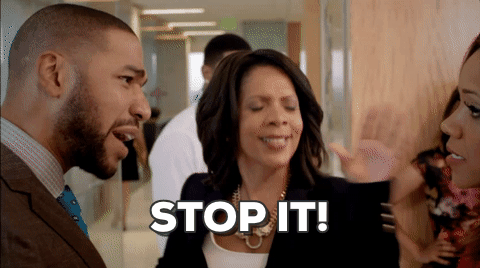ARABIC EXPRESSIONS YOU HAVE DEFINITELY HEARD (BUT PROBABLY DO NOT KNOW THE MEANING OF)
The Arabic language is known to have many words with innumerable different meanings. Some spoken phrases can express two or more different ideas. When it comes to country-specific conversational terms, the list of such is never-ending! There are over 22 Arabic dialects with slang words and phrases differing from one country to another. Nonetheless, with exposure to several varieties of the Arabic language and culture by means of mass media, socializing, traveling, etc., many Arabs are becoming more and more familiar with and are using expressions from other countries in daily life situations.
Here you have it, we’ve selected 11 Arabic expressions from across the Arab world and how they’re used in basic conversations. Yalla, let’s begin!
1. khalas
Translation: done / OK / alright / finish / enough / stop it
Dialect: All Arabic dialects
Depending on the situation, there are many different versions (and tones) of ‘khalas’ that Arabs use. As you can see above, the translations are endless! It can be used to end an argument “khalas now!!” and said when you finish a task, yell at your kids or even when you tell yourself to stop overthinking. Ok, khalas I’ll stop.
 2. yaani
Translation: meaning / like / it’s like
Dialect: All Arabic dialects
In Arabic, yaani is the English word for the slang interjection “like”. It frequently comes up in any conversation. Tweak it up and write it in Arabizi, i.e., the cooler way: “ya3ni”.
3. inshallah
Translation: God willing / hopefully
Dialect: All Arabic dialects
Oh, you’ve surely heard it because Arabs tend to use it so often when speaking. Whether you want to begin or end a conversation (you can add it in between as well) inshallah is your go-to word: “khalas, I’ll finish it today inshallah”.
4. hala wallah
Translation: hi there! / welcome/ my pleasure
Dialect: Gulf
This phrase is widely common in the Gulf countries. It is said when you meet and greet your friends, when welcoming a guest to your home, and …when flirting!
When someone says hi to you say “hala wallah!” (like saying hi back basically). If someone thanks you, you’d reply back with hala wallah, too.
2. yaani
Translation: meaning / like / it’s like
Dialect: All Arabic dialects
In Arabic, yaani is the English word for the slang interjection “like”. It frequently comes up in any conversation. Tweak it up and write it in Arabizi, i.e., the cooler way: “ya3ni”.
3. inshallah
Translation: God willing / hopefully
Dialect: All Arabic dialects
Oh, you’ve surely heard it because Arabs tend to use it so often when speaking. Whether you want to begin or end a conversation (you can add it in between as well) inshallah is your go-to word: “khalas, I’ll finish it today inshallah”.
4. hala wallah
Translation: hi there! / welcome/ my pleasure
Dialect: Gulf
This phrase is widely common in the Gulf countries. It is said when you meet and greet your friends, when welcoming a guest to your home, and …when flirting!
When someone says hi to you say “hala wallah!” (like saying hi back basically). If someone thanks you, you’d reply back with hala wallah, too.
 5. khali wali
Translation: let it be/ forget about it/ whatever
Dialect: Gulf
Those who’ve heard it are most definitely laughing right now. “khali wali” has to be one of the most well-known expressions around the Gulf regions. If you live or have lived in the UAE, you’d hear Arabs, and non-Arabs say it to express annoyance with a person or situation. “Don’t reply to his messages, khali wali.”
6. akeed
Translation: sure! / of course
Dialect: All Arabic dialects
Usually used for confirmation, emphasis or to state something so obvious. “Yes, akeed!”
7. shaku maku
Translation: what’s up?/ what’s new? how’s it going?
Dialect: Iraqi
Shaku maku is literally a phrase that you’d hear throughout the day when Iraqis converse. All Arabs are familiar with this popular colloquial phrase that translates word-for-word to what’s there and what’s not?
It can be used as a casual greeting or when checking up on someone: “Hey! Shaku maku?”. If you wish, you can reply with “maku shi” (nothing’s new).
5. khali wali
Translation: let it be/ forget about it/ whatever
Dialect: Gulf
Those who’ve heard it are most definitely laughing right now. “khali wali” has to be one of the most well-known expressions around the Gulf regions. If you live or have lived in the UAE, you’d hear Arabs, and non-Arabs say it to express annoyance with a person or situation. “Don’t reply to his messages, khali wali.”
6. akeed
Translation: sure! / of course
Dialect: All Arabic dialects
Usually used for confirmation, emphasis or to state something so obvious. “Yes, akeed!”
7. shaku maku
Translation: what’s up?/ what’s new? how’s it going?
Dialect: Iraqi
Shaku maku is literally a phrase that you’d hear throughout the day when Iraqis converse. All Arabs are familiar with this popular colloquial phrase that translates word-for-word to what’s there and what’s not?
It can be used as a casual greeting or when checking up on someone: “Hey! Shaku maku?”. If you wish, you can reply with “maku shi” (nothing’s new).
 8. walaw
Translation: even if / it’s ok / of course/ don’t mention it (when someone thanks you)
Dialect: Levant
Lebanese people use this phrase to make someone feel welcome, express surprise, frustration and so on.
“Walaw, it’s on me, it’s my treat”.
9. ya haram
Translation: aww, poor thing
Dialect: Levant
Use it to express sympathy, i.e. when you feel bad for someone. “Ya haram, are you ok?” It can be used when you’re being serious or sarcastic. Remember, it all goes back to the tone it is said in.
8. walaw
Translation: even if / it’s ok / of course/ don’t mention it (when someone thanks you)
Dialect: Levant
Lebanese people use this phrase to make someone feel welcome, express surprise, frustration and so on.
“Walaw, it’s on me, it’s my treat”.
9. ya haram
Translation: aww, poor thing
Dialect: Levant
Use it to express sympathy, i.e. when you feel bad for someone. “Ya haram, are you ok?” It can be used when you’re being serious or sarcastic. Remember, it all goes back to the tone it is said in.
 10. fahamit alyee shlon?
Translation: do you get what I mean?
Dialect: Levant
Almost every Syrian person you’d encounter would throw fahamit alyee shlon into a conversation! It is more or less a rhetorical question said to emphasize an important point (after an explanation or description of something or a situation). The next time you hear a Syrian talking, listen carefully and observe.
11. min sijak?
Translation: are you serious?
Dialect: Gulf
This question is used to express disbelief and frustration. It’s usually asked in a sarcastic tone to question someone’s actions or statement (it can be on a serious note, too).
A: The flight got delayed
B: Min sijak?
10. fahamit alyee shlon?
Translation: do you get what I mean?
Dialect: Levant
Almost every Syrian person you’d encounter would throw fahamit alyee shlon into a conversation! It is more or less a rhetorical question said to emphasize an important point (after an explanation or description of something or a situation). The next time you hear a Syrian talking, listen carefully and observe.
11. min sijak?
Translation: are you serious?
Dialect: Gulf
This question is used to express disbelief and frustration. It’s usually asked in a sarcastic tone to question someone’s actions or statement (it can be on a serious note, too).
A: The flight got delayed
B: Min sijak?
 Do you want to practice these expressions and many more? Start learning Arabic!
Do you want to practice these expressions and many more? Start learning Arabic!
 2. yaani
Translation: meaning / like / it’s like
Dialect: All Arabic dialects
In Arabic, yaani is the English word for the slang interjection “like”. It frequently comes up in any conversation. Tweak it up and write it in Arabizi, i.e., the cooler way: “ya3ni”.
3. inshallah
Translation: God willing / hopefully
Dialect: All Arabic dialects
Oh, you’ve surely heard it because Arabs tend to use it so often when speaking. Whether you want to begin or end a conversation (you can add it in between as well) inshallah is your go-to word: “khalas, I’ll finish it today inshallah”.
4. hala wallah
Translation: hi there! / welcome/ my pleasure
Dialect: Gulf
This phrase is widely common in the Gulf countries. It is said when you meet and greet your friends, when welcoming a guest to your home, and …when flirting!
When someone says hi to you say “hala wallah!” (like saying hi back basically). If someone thanks you, you’d reply back with hala wallah, too.
2. yaani
Translation: meaning / like / it’s like
Dialect: All Arabic dialects
In Arabic, yaani is the English word for the slang interjection “like”. It frequently comes up in any conversation. Tweak it up and write it in Arabizi, i.e., the cooler way: “ya3ni”.
3. inshallah
Translation: God willing / hopefully
Dialect: All Arabic dialects
Oh, you’ve surely heard it because Arabs tend to use it so often when speaking. Whether you want to begin or end a conversation (you can add it in between as well) inshallah is your go-to word: “khalas, I’ll finish it today inshallah”.
4. hala wallah
Translation: hi there! / welcome/ my pleasure
Dialect: Gulf
This phrase is widely common in the Gulf countries. It is said when you meet and greet your friends, when welcoming a guest to your home, and …when flirting!
When someone says hi to you say “hala wallah!” (like saying hi back basically). If someone thanks you, you’d reply back with hala wallah, too.
 5. khali wali
Translation: let it be/ forget about it/ whatever
Dialect: Gulf
Those who’ve heard it are most definitely laughing right now. “khali wali” has to be one of the most well-known expressions around the Gulf regions. If you live or have lived in the UAE, you’d hear Arabs, and non-Arabs say it to express annoyance with a person or situation. “Don’t reply to his messages, khali wali.”
6. akeed
Translation: sure! / of course
Dialect: All Arabic dialects
Usually used for confirmation, emphasis or to state something so obvious. “Yes, akeed!”
7. shaku maku
Translation: what’s up?/ what’s new? how’s it going?
Dialect: Iraqi
Shaku maku is literally a phrase that you’d hear throughout the day when Iraqis converse. All Arabs are familiar with this popular colloquial phrase that translates word-for-word to what’s there and what’s not?
It can be used as a casual greeting or when checking up on someone: “Hey! Shaku maku?”. If you wish, you can reply with “maku shi” (nothing’s new).
5. khali wali
Translation: let it be/ forget about it/ whatever
Dialect: Gulf
Those who’ve heard it are most definitely laughing right now. “khali wali” has to be one of the most well-known expressions around the Gulf regions. If you live or have lived in the UAE, you’d hear Arabs, and non-Arabs say it to express annoyance with a person or situation. “Don’t reply to his messages, khali wali.”
6. akeed
Translation: sure! / of course
Dialect: All Arabic dialects
Usually used for confirmation, emphasis or to state something so obvious. “Yes, akeed!”
7. shaku maku
Translation: what’s up?/ what’s new? how’s it going?
Dialect: Iraqi
Shaku maku is literally a phrase that you’d hear throughout the day when Iraqis converse. All Arabs are familiar with this popular colloquial phrase that translates word-for-word to what’s there and what’s not?
It can be used as a casual greeting or when checking up on someone: “Hey! Shaku maku?”. If you wish, you can reply with “maku shi” (nothing’s new).
 8. walaw
Translation: even if / it’s ok / of course/ don’t mention it (when someone thanks you)
Dialect: Levant
Lebanese people use this phrase to make someone feel welcome, express surprise, frustration and so on.
“Walaw, it’s on me, it’s my treat”.
9. ya haram
Translation: aww, poor thing
Dialect: Levant
Use it to express sympathy, i.e. when you feel bad for someone. “Ya haram, are you ok?” It can be used when you’re being serious or sarcastic. Remember, it all goes back to the tone it is said in.
8. walaw
Translation: even if / it’s ok / of course/ don’t mention it (when someone thanks you)
Dialect: Levant
Lebanese people use this phrase to make someone feel welcome, express surprise, frustration and so on.
“Walaw, it’s on me, it’s my treat”.
9. ya haram
Translation: aww, poor thing
Dialect: Levant
Use it to express sympathy, i.e. when you feel bad for someone. “Ya haram, are you ok?” It can be used when you’re being serious or sarcastic. Remember, it all goes back to the tone it is said in.
 10. fahamit alyee shlon?
Translation: do you get what I mean?
Dialect: Levant
Almost every Syrian person you’d encounter would throw fahamit alyee shlon into a conversation! It is more or less a rhetorical question said to emphasize an important point (after an explanation or description of something or a situation). The next time you hear a Syrian talking, listen carefully and observe.
11. min sijak?
Translation: are you serious?
Dialect: Gulf
This question is used to express disbelief and frustration. It’s usually asked in a sarcastic tone to question someone’s actions or statement (it can be on a serious note, too).
A: The flight got delayed
B: Min sijak?
10. fahamit alyee shlon?
Translation: do you get what I mean?
Dialect: Levant
Almost every Syrian person you’d encounter would throw fahamit alyee shlon into a conversation! It is more or less a rhetorical question said to emphasize an important point (after an explanation or description of something or a situation). The next time you hear a Syrian talking, listen carefully and observe.
11. min sijak?
Translation: are you serious?
Dialect: Gulf
This question is used to express disbelief and frustration. It’s usually asked in a sarcastic tone to question someone’s actions or statement (it can be on a serious note, too).
A: The flight got delayed
B: Min sijak?
 Do you want to practice these expressions and many more? Start learning Arabic!
Do you want to practice these expressions and many more? Start learning Arabic! 